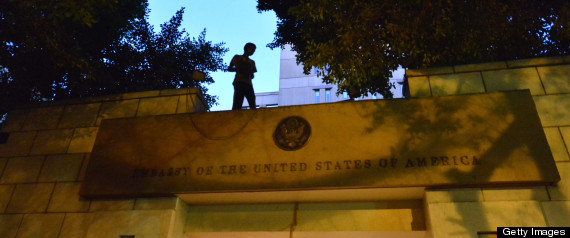JERUSALEM: Nour Nasser s year at Tulane University in Louisiana began with a calamity, but because of it, the Palestinian student has learned to deal with anything. Nasser, who won a U.S. Agency for International Development (USAID) scholarship for graduate studies, arrived in New Orleans in 2005 just as Hurricane Katrina struck.
These days, emergencies do not faze Nasser, who has learned to remain calm and focused. Working as a West Bank field operations representative for Care International, Nasser attributes her inner drive to an intense year she spent as an exchange student in the United States.
It changed my personality, she says. Now I can face anything. This 25-year-old from Ramallah, the West Bank, perseveres until a task is accomplished, whether it is getting insulin to a diabetic grandmother in a remote village or rushing an inhaler for a wheezing toddler past a security checkpoint.
Nasser is one of more than 150 Palestinians who have benefited from USAID s Master s Degree Scholarship Program over the past eight years. Considering the shortage of qualified managers in critical sectors of the Palestinian economy – ranging from business administration, information technology and environmental studies to law, finance, and public health administration – the program bridges a serious gap. Many graduates return immediately to the Palestinian Territories and use US-learned skills to devise new approaches to old problems.
The day before Nasser was scheduled to start classes in public health administration at Tulane the weather was inclement and growing worse by the minute. Her flight landed at Louis Armstrong Airport on August 29, 2005, only moments before Hurricane Katrina made landfall. Nasser and her fellow passengers endured the monster storm s full fury. She was unhurt, but seeing some of Katrina s 1,836 fatalities floating in the streets was sobering. Compared to their problems, hers seemed like minor inconveniences.
Still, except for her carry-on suitcase, all her belongings were ruined, left in a sodden heap on the floor of her student rental. Eventually we made it out to Baton Rouge [Louisiana] … and then we were put onto a helicopter flight to Atlanta, she recalled two years later.
Nasser found herself in shock at the Atlanta airport, slumped in a plastic chair with her head in her hands, too stunned to weep. As her hair hid her face like a black curtain, a thief snatched the carry-on bag containing a laptop computer and her passport. Her purse, stuffed with enough cash to last the entire school year, was taken, too. Since her Palestinian bank had no US branches, she had intended to deposit this money in a US bank upon arrival.
I was left with nothing. No credit cards, no passport – no clothes, even. Cell phones were not working, even if you had managed to hold onto one, she said. The Delta Air Lines staff agreed to give me a free ticket and evacuate me to New Mexico. People were very sympathetic, but there was no master plan.
Determined to get her academic career on track, Nasser refused to wait in New Mexico and went to the USAID office in Washington to press the administrators of her scholarship for solutions.
I d lost all my addresses and everything else in a single day and it turned me upside down. I was fighting depression. I felt I had to help myself and make the most of my one year in the US, she said. Within 11 days, I enrolled at George Washington University – even with no documents – and rented a small room. But I couldn t sleep for months.
A few of Nasser s acquaintances from the USAID program at Tulane were encouraged by her example and joined her in Washington. Then Dave Sislen, a professor at Johns Hopkins University, loaned his villa to these Palestinian girls, Nasser said. He s Jewish and very generous. And a complete stranger. He d called up the alumni association at Tulane, where he d gone to school himself, and asked what he could do for hurricane victims. He even gave us all tickets to the [Washington] Redskins football game. What an inspiration.
Sislen s generosity ensured that the thief in the Atlanta airport did not define Nasser s recollections of Americans.
With perseverance, Nasser completed her master s degree on time, earning the highest possible marks. She returned to the West Bank, and soon was hired by Care International, which administers a US grant to fund medical aid. Nasser finds inspiration in the lessons she learned in America. It s not just delivering medications. Sitting and listening to people s stories is another kind of medicine. It makes a difference for poor people in poor villages. It gives them power, and is like a gift, she said.
Nasser s experience shows the value of foreign studies as a strategy for building the Palestinians capacity to run their own state and to revive their economy.
At least 60 scholarship students have returned with US degrees to take leadership roles in the Palestinian community. These include the chief of electoral affairs at the Palestinian Central Election Commission, a trade specialist at the Ministry of National Economy, an engineer for a major public works program, and an investigative reporter for Al-Jazeera.net. And, of course, one feisty humanitarian aid worker for Care International, who had her courage tested by Hurricane Katrina and remains a bundle of energy.
Jan McGirkis a USINFO special correspondent. This article is distributed by the Common Ground News Service (CGNews) and can be accessed at www.commongroundnews.org. Source: US Department of Stat, http://usinfo.state.gov.


